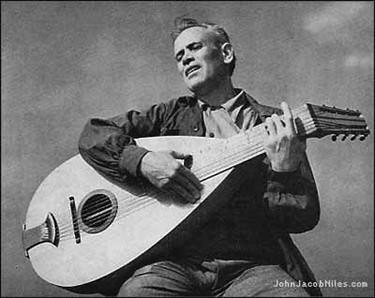Pure products of America go crazy

Go 'Way From My Window - John Jacob Niles
John Jacob Niles was from Kentucky. Not the hardscrabble, subsistence farming part, the region from which you expect plainspoken folk singers to spring forth, but the bluegrass, horse-breeding one. His family was musical and he wrote his first song, "Go 'Way From My Window" when he was 16. In his words:
In 1908 my father had in his employ a Negro ditch-digger known as Objerall Jacket. As he dug, he sang, "Go way from my window, go way from my door" -- just those words, over and over again, on two notes. Working beside Jacket all day, I decided that something had to be done. The results were a four-verse song dedicated to a blue-eyes, blond girl, who didn't think much of my efforts. The song lay fallow from 1908 to 1929, when I arranged it and transposed to a higher key.
It's hard to imagine what the song was before, but Niles' high register--stretching into soprano range--is what makes it so unsettling. Or it may be its unclassifiableness. It's folk music, sure, conversant with ballads and songs of mountain people, but hemmed round by spirituals, dusted with early blues, informed by classical concert halls. In the 1920s, following a conservatory stint, Niles sang for the Chicago Lyric Opera. He also collected and published hundreds of American ballads (introducing America to its history as Harry Smith did), built his own dulcimers, taught school and farmed. He was a renaissance man, and a bit of a patrician. But when Niles sings in his uncanny falsetto or chokes on lines like "I'll give you back your ring," there's a hint of common madness, of shallowly buried frustration that seems to say something about the American experience if you're inclined to believe William Carlos Williams' pained assessment in "To Elsie."
From John Jacob Niles Sings Folk Songs (eMusic)
James Alley Blues - Richard "Rabbit" BrownGreil Marcus calls "James Alley Blues" the "greatest record ever made" and even if you don't precisely agree, you understand where he's coming from. One of only six songs recorded in 1927 by New Orleans bluesman (or "songster," as street corner musicians were then called) Richard "Rabbit" Brown, it's remarkably modern, or, to take a rockist stance: You'll find most of the germs of the music of the second half of the 20th century contained within. Marcus is vexed when one of his academic colleagues refers to Brown's recording as "the one that sounds like Cat Stevens," and yes, there's Brown's expressive vocal delivery. But really, it's his guitar playing, the zig-zagging jags of syncopation, a funny, lopsided, irregular dance. But Brown's lyrics sung through clenched teeth pull in the opposite direction:
Ah, sometimes I think that you're just too sweet to die,
And other times I think that you ought to be buried alive.
And thus you understand that this is a murder ballad, before the murder. It may literally memorialize the cruel woman who done Brown wrong, but also reads as a warning, a casual grenade tossed at Jim Crow society.
From Anthology of American Folk Music (US, UK)



3 Comments:
funny because i first heard john jacob miles last month for the first time and i couldn't get enough of his crazy voice. nice.
a rev-ola release
Incredible!
Seeing as how I actually live in Kentucky, and the hardscrabble, subsistence farming part at that, I'm shocked, shocked that I've not heard this man's voice before.
Incredible!
Post a Comment
<< Home